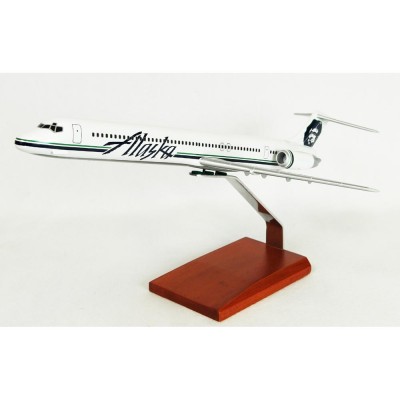1-877-795-2278 | info@aircraftspruce.ca
Aircraft Spruce Canada
Brantford, ON Canada
Corona, CA | Peachtree City, GA
Chicago, IL | Wasilla, AK
Aircraft Spruce Canada
Brantford, ON Canada
Corona, CA | Peachtree City, GA
Chicago, IL | Wasilla, AK
SAME DAY SHIPPING ON ORDERS PLACED BY 2 PM | 877-795-2278
MD-80 Alaska Model
$352.00/Each
Part# 13-11029
MFR Model# KMD80ATR
MFR Model# KMD80ATR
Overview
|
The McDonnell Douglas MD-80 is a twin-engine, medium-range, single-aisle commercial jet airplanes. The MD-80 aircraft was originally part of the DC-9 line when first delivered before being later renamed. The MD-80 series have seating capacity up to 172 passengers. They have a common cabin layout that seats 140 passengers on scheduled flights and 161 or 165 on low-cost or charter flights. The Alaska Airlines flew MD-80 aircraft on the routes more than 92 cities in the United States, Canada and Mexico. Alaska airlines operates a fleet of Boeing 737 and MD-80. The airline ultimately plans to replace all MD-80 aircraft with Boeing 737-800s by the end of 2008. The retired MD-80s will be stored in Mojave Spaceport in Mojave, California or Southern California Logistics Airport in Victorville, California. The MD-80 series was derived from the DC-9 and it was introduced commercially in October 1980 by Swissair. It entered service in 1980. The MD-80 versions have cockpit, avionics and aerodynamic upgrades along with the more powerful, efficient and quieter JT8D-200 series engines. The MD series aircraft also have longer fuselages than their earlier DC-9 counterparts, as well as longer range. The MD-80 series has been used by airlines around the world. The MD-80 series production ended in 1999. Notably, some customers, American Airlines and Alitalia still, as of 2007, refer to the planes in fleet documentation as ""Super 80"" or ""SP80"". The MD-80 model is still flown extensively by American Airlines and Delta Airlines on domestic routes. |
Q&A
Please note, Aircraft Spruce Canada's personnel are not certified aircraft mechanics and can only provide general support and ideas, which should not be relied upon or implemented in lieu of consulting an A&P or other qualified technician. Aircraft Spruce Canada assumes no responsibility or liability for any issue or problem which may arise from any repair, modification or other work done from this knowledge base. Any product eligibility information provided here is based on general application guides and we recommend always referring to your specific aircraft parts manual, the parts manufacturer or consulting with a qualified mechanic.

 Aircraft Spruce Canada
Aircraft Spruce Canada





